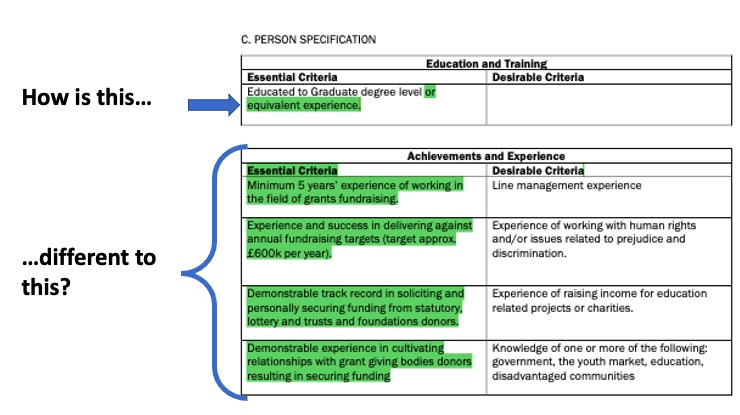Written by David Burgess – 4th July 2021
A common reply when we challenge organisations about the inclusion of discriminatory* degree requirements is
“If you read it properly you’d see it actually says “degree or equivalent experience”.
This blog aims to show you why “or equivalent experience” doesn’t change things as much as you might think. To do that, we’d like you to consider the following questions:
1) Firstly, equivalent what?
A number of job ads will just say “a degree level qualification or equivalent”. But does this mean qualifications equivalent to a degree, or does it extend to professional experience. So, first things first. Does your job ad make it clear to applicants what will be accepted for this criteria?
If it just means equivalent qualifications you should probably check out this article – http://nongraduateswelcome.co.uk/articles/is-it-discriminatory
If it means equivalent professional experience, read on!
2) How do you quantify how much professional experience is equivalent to a degree?
Without an agreed definition of equivalence here, can you quantify what you are actually looking for? The average degree course is 3 years, so does it mean 3 years professional experience? It is total number of Continued Professional Development hours completed? Is it amount of money raised?
One possible definition is that you are looking for the skills associated with a Level 6 qualification, as set out in the Regulated Qualifications Framework (or equivalent framework based on your country of operation) – https://en.wikipedia.org/wiki/National_qualifications_frameworks_in_the_United_Kingdom. But, if this is what you are looking for, why not specify this in the person spec and let applicants decide how best to evidence it. Because let’s face it – you’ve almost certainly already included these criteria as requirements!
This might seem like a semantic argument but it has a number of important implications:
- If you can’t clearly quantify what equivalent looks like, how will you be able to take a consistent approach in assessing applications from those who didn’t go to university?
- With no universally agreed definition, there is the chance that different people involved in the recruitment process will have different definitions. What processes or guidance have you put in place to ensure that everyone involved in the process is using the same definition so as to treat all applicants fairly?
- You are putting non-graduates at a disadvantage. While proving that you have a degree is simple, proving equivalence puts a greater burden of interpretation onto non-graduate applicants, with them having to guess whether their definition of equivalence is the same as yours.
3) If I’ve not done a degree, how am I supposed to know if my professional experience is equivalent??
More often than not, this requirement is added by a recruiting manager that went to university. So, when pushed to define equivalence they can compare their experience of work to their experience of completing their degree. However, when it comes to non-graduate applicants you are asking them to demonstrate how their work is equivalent to something of which they have no personal experience. This obviously puts them at a disadvantage. As mentioned above, even if they decide that their experience is equivalent there is no guarantee their interpretation will match that of the recruiting manager.
4) How does “equivalent experience” differ to the 10 essential requirements already listed on person spec?
When “educated to degree level” is included on a person specification it is almost always followed by 7 to 12 other requirements relating to the professional experience the applicant must have. So how is “equivalent experience” different to these requirements? If it’s the same (or less) then the degree part becomes redundant and should be deleted:
- You must have a degree or experience
- You must have experience

Again, this goes beyond mere semantics, because…
5) What message do you think it sends to non-graduates that a degree is listed as the preference or default?
More often than not, where this discriminatory requirement is included it is the very first thing on the person spec. Since our campaign started in 2019 we have heard time and again from non-graduates that this sends a clear message to that your organisation sees them as less desirable and that they will not be welcome there.
So, even if it’s not your intention to discriminate against non-graduates this is the end result of continuing to use this requirement. In doing so, you are locking incredibly talented people out of the fundraising profession…
…And you are denying your organisation the chance to recruit amazing people with all the skills and ability they actually need to succeed.
*For more on why we say it’s discriminatory to include “Educated to degree level” on your job ads, read this article – http://nongraduateswelcome.co.uk/articles/is-it-discriminatory